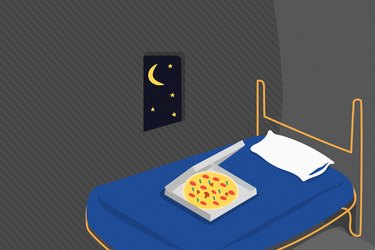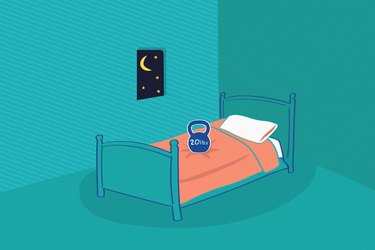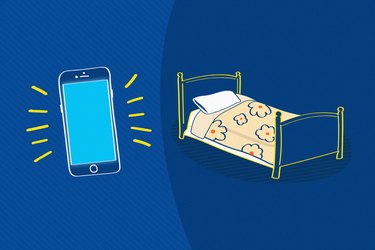
We're all guilty of enjoying a late-night snack — a few cookies, maybe, or a cold slice of pizza after a night out — even when we know it's probably not the best decision. But what are the actual risks of sleeping after eating, and is it bad to eat before bed?
As it turns out, there are a few good reasons for not hitting the hay right after a meal or heavy snack. While your eyes are resting, your body is hard at work digesting those last bites, and this can lead to some unpleasant gastrointestinal (GI) issues, sleep problems and maybe even weight gain.
Video of the Day
Here are the possible side effects of sleeping after eating and what to do instead.
1. You Could Get Heartburn
Even if you're not going to sleep, you might wonder: Is it bad to lie down after eating? Lying flat on your back right after a heavy meal may feel good at first, but digestion should be carried out in an upright position. When your stomach is full of food and gravity is no longer in your favor, your stomach acid (which ramps up during digestion) may come up through your esophagus, giving you acid reflux, according to the Mayo Clinic.
The most common symptom of acid reflux is heartburn, a painful burning in the middle of your chest, behind the breastbone. Having these digestion issues are not only unpleasant, but they may prevent you from getting a good night's sleep, too.
But not all foods are created equal when it comes to late-night noshing. "Though having a slice of carbohydrate-loaded, grease-covered pizza, washing it down with a carbonated beverage and lying down immediately after will probably leave you with the worst acid reflux of your life, eating a kiwi an hour before sleep can actually be beneficial. The kiwi contains chemicals that aid with sleep quality," says Shanna Levine, MD, owner of Goals Healthcare.
2. You May Not Sleep as Well
Not only will GI issues keep you up at night, but there's also some evidence that eating (especially fatty foods) or drinking later in the day may make it harder to actually fall asleep, per the Mayo Clinic.
You probably know too much caffeine can keep you up at night, but alcohol interferes with sleep too. Yes, it might make you sleepy, but it can prevent you from getting a restful, deep sleep and cause you to wake up in the middle of the night. Not to mention, you may have to get up during the night to go to the bathroom, depending on what and how much you eat or drink before bed.
3. It's Linked to Weight Gain
Eating late at night has other risks, including the impaired judgment and weakened willpower than can come with being tired. When you're hungry at night, taking the time to make a salad may not be as appealing as reaching for that package of cookies.
"As an independent factor, late-night snacking won't necessarily cause obesity. Obesity is a chronic disease caused by a combination of factors, including genetics, metabolism, diet, physical abilities and medications," says Laura Giannone, RD, CDN, a consulting nutritionist in Freehold, New Jersey. "However, body weight along with BMI can most definitely increase if one habitually snacks on calorie-dense foods late at night, especially if one is generally more sedentary."
So, when you eat is not nearly as important as what or how much you eat. But these three factors are somewhat connected.
A small November 2014 study in Nutrition Research showed that adults who ate later in the day had an increased risk of weight gain due to a higher daily caloric intake. Similarly, another study from February 2019 in Nutrients concluded that adolescents who tended to eat early main meals and night snacks had higher BMI and waist circumferences than those who ate slightly later main meals without a snack.
"Every food choice contributes to your overall sleep quality, and that is why the quality and quantity of the food you eat is so important."
How to Prevent the Negative Effects of Sleeping After Eating
What time should you stop eating? Dr. Levine suggests waiting at least an hour after eating to go to sleep. "But a heavier meal will require more time," she notes. "A high-fat meal, such as a burger or a steak, is digested very slowly. I would allow at least three hours for meals such as this to digest. Though data is limited, it has been shown that high-fat meals prolong the time it takes you to fall into deep sleep."
Late-night eating may be unavoidable due to work, school or life in general. But if and when you find yourself having a meal or snack close to bedtime, try to make healthier choices.
What to Eat Before Bed
"Opt for foods that have a balance of protein, carbohydrates and fiber. Balanced snacks will help stabilize your blood sugar levels, which is necessary for a restful sleep," Giannone says.
She and Dr. Levine suggest the following:
- Whole-grain crackers with low-fat cheese
- High-fiber cereal with milk
- Greek yogurt with a sprinkle of granola
- Almonds
- Kiwis
Other foods that might help with sleep include:
- Walnuts
- Tart cherry juice
- Peanut butter
- Oatmeal
- Salmon
- Turkey
- Tofu or edamame
"Every food choice contributes to your overall sleep quality, and that is why the quality and quantity of the food you eat is so important," Dr. Levine adds. "Many healthy foods may be beneficial in helping you fall asleep as well as stay asleep."
How to Stop Eating Late at Night
Late-night eating when you're not actually hungry means you're consuming unnecessary calories. Here, Giannone gives LIVESTRONG.com some tips on how to curb your appetite:
- Get more sleep. Research has shown that sleep deprivation promotes hunger and therefore can increase body weight. Compounding this problem is that lack of sleep can also affect hormones that help to regulate weight.
- Plan ahead. You're more likely to overeat at night if you don't feel satisfied from your diet during the day. Skipping meals can lead to psychological justification for eating at night. Conversely, eating meals that are balanced throughout the day paired with small snacks in between will provide your body with a steadier source of energy that will keep you satiated.
- Impose a 15-minute rule. Snacking can be as emotionally and psychologically gratifying as it is physically. If you feel hungry, drink water, then try to divert your attention to something other than food (like reading or listening to a podcast). Ask yourself if you're actually hungry or if other emotions are coming into play (like boredom, sadness, stress). You may realize you're not really hungry after all.
Why Do You Feel Sleepy After Eating?
It's common to feel tired after eating. When you eat, your body releases hormones that help you feel relaxed, and it also sends more blood supply to your GI tract to help with digestion, meaning your brain gets a bit less. This sleepy feeling may be even more pronounced if you've eaten a lot or are eating foods high in protein or carbs (hello, Thanksgiving dinner), which take a bit more effort to digest.
Feeling extremely tired after eating isn't normal, though, and can be a sign of an underlying condition like diabetes, according to the American Diabetes Association. Fatigue after meals is also linked to food allergies and digestive issues like celiac disease. If you find that you're always very sleepy after eating, talk to your doctor, who can help you figure out if it's normal or the symptom of a medical condition.
How to Stop Feeling Sleepy After Eating
- Watch your portion size: The more you eat, the more your body needs to digest. When your digestive tract is in overdrive, that can make you feel sluggish.
- Balance your plate: As mentioned above, eating foods high in protein and carbs can make you feel tired, so try balancing out the nutrients on your plate. If you're eating pasta, for example, swap your side of bread for a side salad to cut down on your total carb count.
- Talk to your doctor: If you always feel tired after eating and the above steps don't help, talk to your health care provider about your symptoms so you can rule out an underlying condition such as diabetes or food allergies.
So, How Bad Is It Really to Sleep Right After You Eat?
If you're craving something delicious late at night once in a while, then go for it, because nothing too serious will come of it. But eating heavy meals before bed shouldn't become a habit, or you'll risk digestive issues, poor-quality sleep and possibly weight gain.
Instead, give yourself time to digest before hitting the hay, and if that's not possible, then try to reach for healthier and easier-to-digest foods.
- Mayo Clinic: "How Heartburn and GERD Occur"
- National Institute of Diabetes and Digestive and Kidney Diseases: "Symptoms & Causes of GER & GERD"
- Mayo Clinic: "Foods and Sleep"
- Nutrition Research: "Meal Timing Influences Daily Caloric Intake in Healthy Adults"
- Nutrients: "Diurnal Patterns of Energy Intake Derived via Principal Component Analysis and Their Relationship with Adiposity Measures in Adolescents: Results from the National Diet and Nutrition Survey RP (2008-2012)"
- The Washington Post: "Why Eating Late at Night May Be Particularly Bad for You and Your Diet"
- Mayo Clinic: "Mayo Clinic Minute: Timing Snacks to Avoid Heartburn"
- American Diabetes Association: "Diabetes Symptoms"
Is this an emergency? If you are experiencing serious medical symptoms, please see the National Library of Medicine’s list of signs you need emergency medical attention or call 911.



